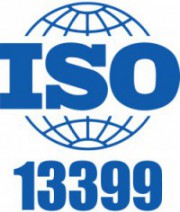Tool parameters according to ISO 13399
All toolholders and cutting tools are defined by a number of parameters according to the standard ISO 13399. You find both the cutting tool parameter and its definition in this list.
In the medium term, KEMMLER Präzisionswerkzeuge will present all tool parameters in ISO 13399 parameters in the online shop and print catalogues. New articles have already been created accordingly.
What is ISO 13399?
ISO 13399 is an international cutting tool information standard. Each cutting tool is defined by a number of these standardized ISO 13399 parameters. The standard provides cutting tool information in a neutral format that is independent of any particular system or company nomenclature. With tools that are clearly defined according to a standard that all software can process, the quality of communication gets better and the electronic data exchange between systems runs smoothly. The data gathering process will be more efficient and of higher quality. Ultimately, the standard saves time and gives an extra guarantee of quality. A common language is valuable from a system to system point of view, but will also make life easier for users. Once you have an ISO13399 compliant system, there will be no need to manually interpret data from paper catalogues and then key-enter it into your system.

Parameter = Definition
ALP = Clearance angle axial
ANN = Clearance angle minor
APMX = Depth of cut maximum
B = Shank width
BAWS = Body angle workpiece side
BBD = Balanced by design
BBR = Balanced by rotational test
BD = Body diameter
BHTA = Body half taper angle
BS = Wiper edge length
BSG = Basic standard group
CDX = Cutting depth maximum
CHW = Corner chamfer width
CICT = Cutting item count
CND = Coolant entry diameter
CNSC = Coolant entry style code
COATING = Coating
CNT = Coolant entry thread size
CP = Coolant pressure
CRKS = Connection retention knob thread size
CTPT = Operation type
CUTDIA = Work piece parting diameter maximum
CW = Cutting width
CWTOLL = Cutting width lower tolerance
CWTOLU = Cutting width upper tolerance
CXSC = Coolant exit style code
CZC = Connection size code
CZC MS = Connection size code machine side
CZC WS = Connection size code workpiece side
DAH = Diameter access hole
DAXIN = Axial groove inside diameter minimum
DAXX = Axial groove outside diameter maximum
DBC = Diameter bolt circle
DC = Cutting diameter
DCB = Connection bore diameter
DCBN = Connection bore diameter minimum
DCBX = Connection bore diameter maximum
DCF = Cutting diameter face contact
DCON = Connection diameter
DCSFMS = Contact surface diameter machine side
DCSFWS = Contact surface diameter workpiece side
DCX = Cutting diameter maximum
DIX = Tool changer interference diameter maximum
DMIN = Minimum bore diameter
DMM = Shank diameter
DN = Neck diameter
DSGN = Design
D1 = Fixing hole diameter
FHA = Flute helix angle
FLGT = Flange thickness
FTDZ = For thread diameter size
H = Shank height
HF = Functional height
HRY = Lowest point from reference plain
HTB = Body height
HTH = Height
IC = Inscribed circle diameter
INSL = Insert length
IZC = Insert size code
KAPR = Tool cutting edge angle
KCH = Corner chamfer
L = Cutting edge length
LB = Body length
LCF = Length chip flute
LE = Cutting edge effective length
LF = Functional length
LGR = Regrind length
LH = Head length
LPR = Protruding length
LS = Shank length
LSC = Clamping length
LSCN = Clamping length minimum
LSCX = Clamping length maximum
LSD = Dead shank length
LU = Usable length (max. recommended)
MHD = Mounting hole distance
MIID = Master insert identification
MMCC = Code for preset torque
NOF = Flute count
OAH = Overall height
OAL = Overall length
OAW = Overall width
OHN = Overhang minimum
OHX = Overhang maximum
PHD = Premachined hole diameter
PHDX = Maximum premachined hole diameter
PL = Point length
PRFRAD = Profile radius
PRSPC = Profile specification
PSIR = Tool lead angle
PSIRL = Cutting edge angle major left hand
PSIRR = Cutting edge angle major right hand
RADH = Radial body height
RADW = Radial body width
RE = Corner radius
RETOLL = Corner radius lower tolerance
RETOLU = Corner radius upper tolerance
RPMX = Rotational speed maximum
S = Insert thickness
SDL = Step diameter length
SIG = Point angle
SSC = Insert seat size code
SUBSTRATE = Substrate
TCDC = Tolerance class cutting diameter
TCDMM = Shank diameter tolerance
TCHA = Achievable hole tolerance
TCT = Tolerance class tool
TCTR = Thread tolerance class
TD = Thread diameter
TDZ = Thread diameter size
TFLA = Tap floating length ahead
TFLB = Tap floating length behind
THCHT = Threading chamfer type
THFT = Form type
THLGTH = Thread length
THUB = Hub thickness
TP = Thread pitch
TPI = Threads per inch
TPIN = Threads per inch minimum
TPIX = Threads per inch maximum
TPN = Thread pitch minimum
TPX = Maximum thread pitch
TQ = Torque
TSYC = Tool style code
ULDR = Usable length diameter ratio
WB = Body width
WF = Functional width
WSC = Clamping width
WT = Weight of item
W1 = Insert width
ZEFF = Face effective cutting edge count
ZEFP = Peripheral effective cutting edge count (ZEFP)
ZWX = Maximum number of Wiper inserts